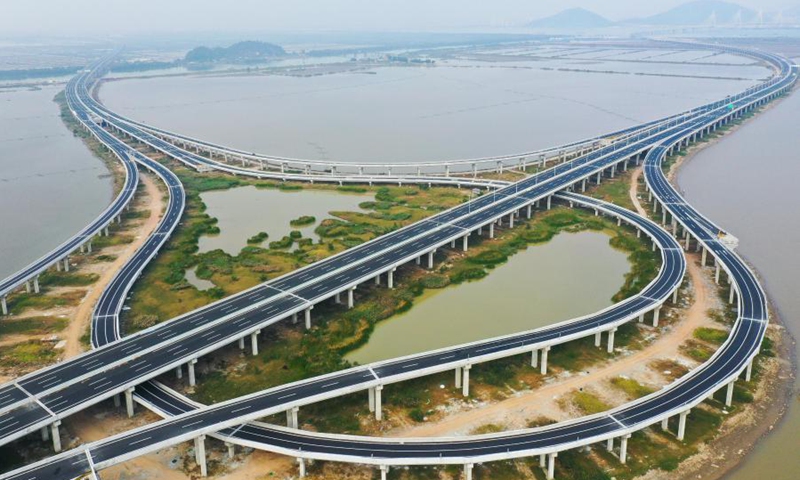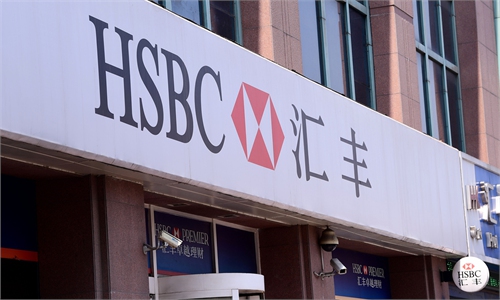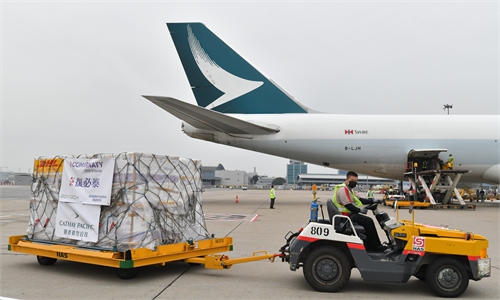HK and mainland to expand GBA financial connectivity by expanding remote bank accounts setup and testing digital renminbi

Aerial photo taken on Dec. 9, 2020 shows an interchange of Hezhou-Gaolan Port Highway on the Pearl River estuary in south China's Guangdong Province. Upon completion, the 35-km highway will be an important channel linking the west bank of the Pearl River estuary and the Guangdong-Hong Kong-Macao Greater Bay Area. (Xinhua/Liu Dawei)
Regulators in Hong Kong and the Chinese mainland are reportedly working to enhance financial connectivity in the Guangdong-Hong Kong-Macao Greater Bay Area by rolling out three policies by the end of this year, including letting people remotely open bank accounts through more banks, media reports cited Eddie YueWai-man, Chief Executive of the Hong Kong Monetary Authority as saying.
According to Eddie Yue, regulators would expand the range of trial banks that allow setup of remote bank accounts in the Greater Bay area from just Bank of China to more banks.
Under a pilot scheme in March 2019, residents in Hong Kong were allowed to open mainland accounts without having to visit the mainland in person via the Bank of China (Hong Kong). The scheme has been welcomed by residents by thousands of successful applicants, according to media reports.
Dong Dengxin, director of the Financial Securities Institute at Wuhan University of Science and Technology, said that the expansion of remote bank accounts will help facilitate stock trading between Hong Kong and mainland.
"With capital flow becoming more convenient between Hong Kong and mainland, the stock trading activities via Hong Kong-Shenzhen stock connect will be more active," Dong told the Global Times.
Additionally, a cross-border renminbi cash pooling mechanism as well as cross-border financial supervision sandbox will be established in the area, said Eddie Yue.
Those three measures involve "relatively little" regulatory policy barriers between mainland and Hong Kong, and therefore could be implemented in 2021, he said.
He also noted that the Hong Kong Monetary Authority is conducting tests for digital renminbi's cross-border payment along with the Digital Currency Research Institute of the People's Bank of China.
The southbound leg of the current Bond Connect scheme, which will allow mainland investors to trade bonds in Hong Kong, will likely to be launched in the second half of this year.
The measures are an extension of policies rolled out by Hong Kong and mainland governments to connect the financial markets in the region following the launch of the Greater Bay Area development plan in February 2019. Such measures include encouraging Hong Kong banks to set up agencies in mainland as well as establishing a cross-border wealth management pilot scheme for the region.
Dong Dengxin, director of the Financial Securities Institute at Wuhan University of Science and Technology, said that the expansion of remote bank accounts setting helps facilitate stock trading between Hong Kong and mainland.
"With capital flow being more convenient between Hong Kong and mainland, the stock trading activities via Hong Kong-Shenzhen stock connect will be more active," Dong told the Global Times.
Dong also said that financial connectivity between Hong Kong and mainland has a lot of room for future development, including issuing offshore renminbi bond in Hong Kong and equity financing cooperation.
"Currently, the biggest problem in GBA financial connectivity is still the barriers in financial systems between Hong Kong and mainland, and the major task is for regulators to break down those barriers to integrate the two regions' financial mechanisms," Dong said.
Global Times



